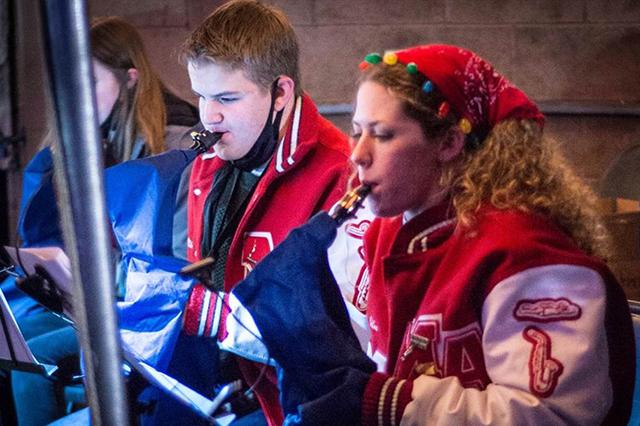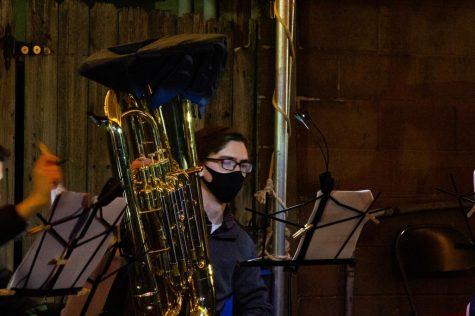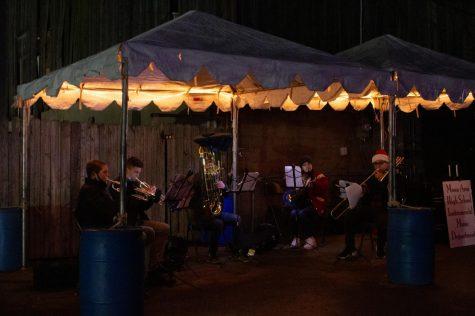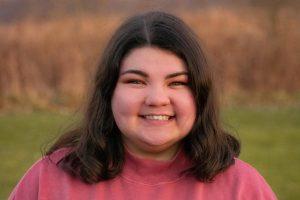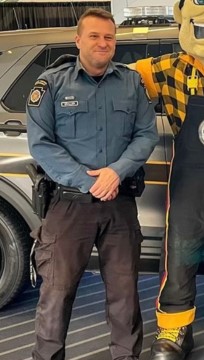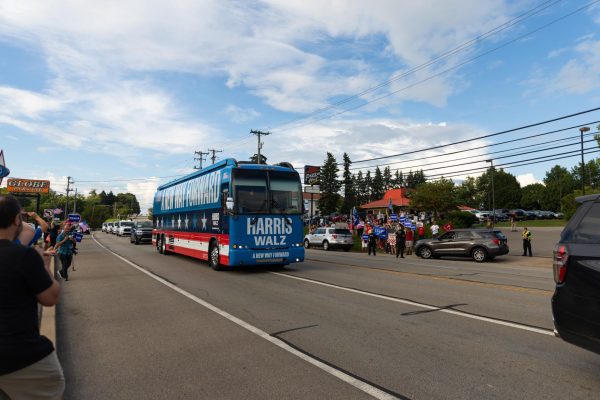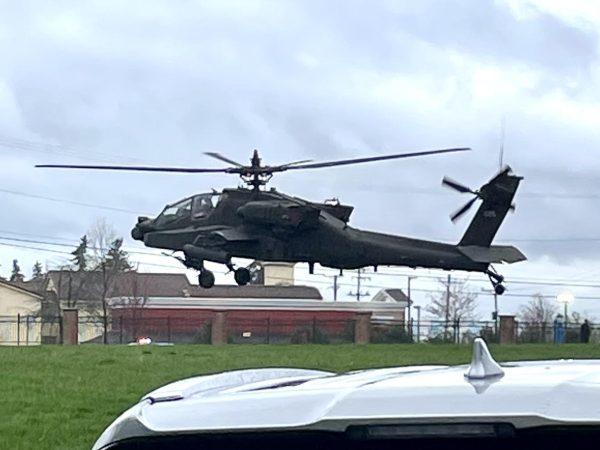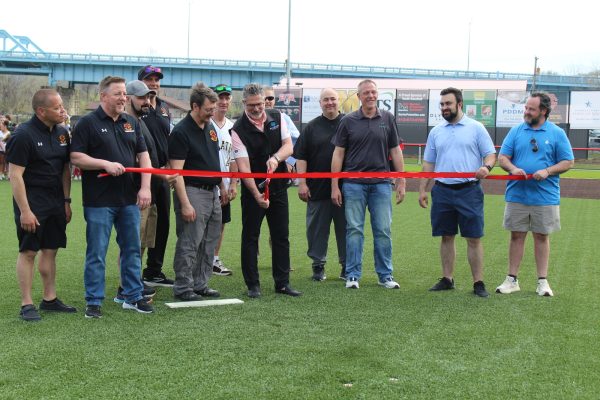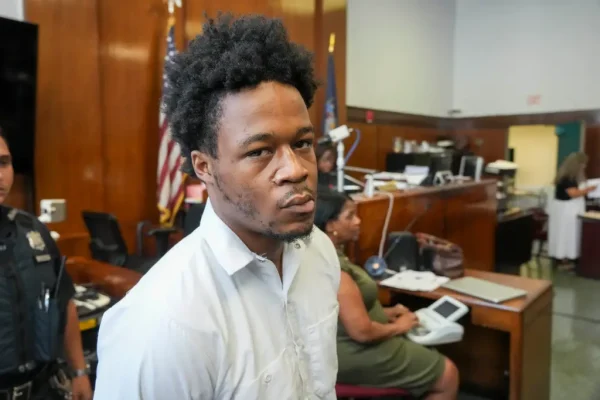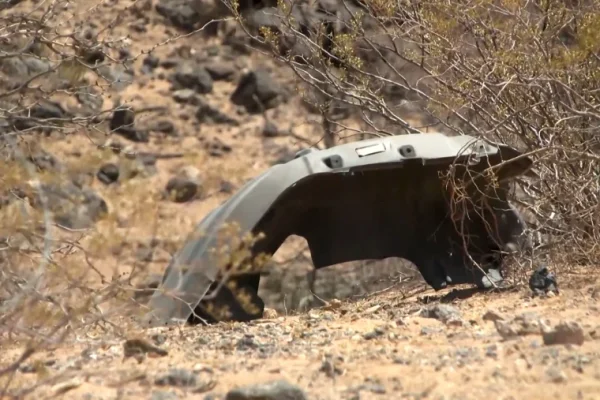Moon Area High School Band highlights the various changes to play in a pandemic
MOON TOWNSHIP — For many bands across the nation, the brass and wood instruments they use to entertain remain cold or at home. Amidst a pandemic where the virus is spread through the air, the concept of a marching band is hard to manage in a safe and efficient way.
Many after-school programs have faced this same issue, leading to a lack of social environments and opportunities for students to interact with their social cliques. While freshmen in marching bands may see the “new normal” as their first highschool hurdle, many seniors are missing out on some of the most important days before college and vital experience in performing.
As many of these extracurricular programs still struggle to find safe ways to gather and prevent cases, the Moon Area High School band has made the necessary changes to allow their seniors a final year of performances and interactions with their bandmates.
“Our opportunities for performances were diminished ten-fold,” said Nicholas Barthen, Director of Bands for MAHS. “That took a toll, that was the biggest [change.] We stay physically distanced, making sure everybody is safe, and we split into two pods of 50s throughout the summer. Thankfully, we were able to come together in mid-October to start to perform.”
As Moon Area High School adapted to the pandemic lifestyle, the band was forced to get creative with their protective measures. One of these was through fabric bags, which operate similar to a mask for instruments.
“They can’t see their fingers [as they play],” said Barthen. “It’s sealed in a bag to catch all of the aerosol disbursement and things like that.”
In addition to bags, some performers use different styles of masks for ease of playing. For senior Julia Platt, who plans on going to Ohio State to pursue a law degree after this year, playing the flute has been more difficult in the pandemic.
“I opt for wearing the face shield [when I play],” said Platt. “That way all of the air gets blocked in front of my face. I will say my listening environment is different because of that face shield, so I hear an echo because of the sound bouncing off of my face shield making me hear myself play a lot more than usual.”
“For my instrument, we cut a little slit in the front of our masks so we can play through it,” said Nick Patterson, a senior saxophone player with plans to attend Penn State for Architecture next year. “I know that the mask usually gets in my mouth at least 10 times a day when we play.”
The struggle for students isn’t one they expected, but they appreciate the opportunity to practice as a group and understand the need for extra precautions.
“I think the distance is a hurdle we knew that we would need to overcome,” said Platt. “As a student, I’m trying to focus on my personal accountability. If I can play this correctly and everyone else is able to play this correctly for themselves, then we should be able to mesh a bit better even though we can hear each other as well.”
Changes in learning aren’t just affecting students, either. In an online format, judging how a band plays together is difficult for Barthen. With limitations in personal technology, as well as internet connections, his instructions and observations can get lost in the digital landscape.
“What’s really difficult is the students who choose to be virtual still,” said Barthen. “I can’t hear them play as we practice. That was the most difficult challenge, especially as we came back after the holidays. I could see all of them on the screen, but I couldn’t hear them because of the lag.”
These necessary protections have helped protect student health, but also led to a smaller number of live performances for the band. Rather than the normal number of fall performances, which would average around 20 for the season, the band was only able to host three performances. When accounting for their limited spring appearances, this brings their total performance for the year to five times on either the stage or field.
One creative way Barthen has hosted a limited number of concerts is through virtual livestreams, where the audience can join to watch a video performance. While this opens opportunities for relatives near and far to see performances they may have missed otherwise, the students admit that the experience can be jarring at first.
“If Mr. Barthen would try to crack a joke to the ‘audience,’ it was met with silence,” said Patterson. “That was probably one of the weirdest experiences with having nobody there.”
Fundraising has also taken to the digital environment, with the band hosting some of their first social media based fundraising during the pandemic. While the limits to in-person fundraising were a drastic change, they have also seen some success in the new formats.
“Just like how everyone else in the world has come up with new ways to do things, we have utilized a lot of social media and it has paid off this year,” said Barthen. “It’s something that we will be doing forever now. We’ve always had those tools, but not everyone was as comfortable with using them before.
Aside from technical changes to the typical band practices, the social atmosphere has also changed around the band room. While students usually gathered in person and socialized during practice, the virtual practice environment has led to some students not seeing each other for long periods of time.
“I think the band did a good job making our senior year as good as it could have been,” said Platt. “We still had our senior recognition night and were able to have a ‘party’ where we could socialize and talk about what we did get to experience. The whole world has changed this past year, but I think band is one of the things we were able to make the most out of what we had.”
As the nation begins to look towards the horizon and the easing of statewide restrictions, the effects and threat of COVID-19 continues to linger over Western Pennsylvania and its high schools.
While the pandemic is certainly not the environment that the seniors imagined their final year looking like, their help in stopping the spread is making a difference at their school.



